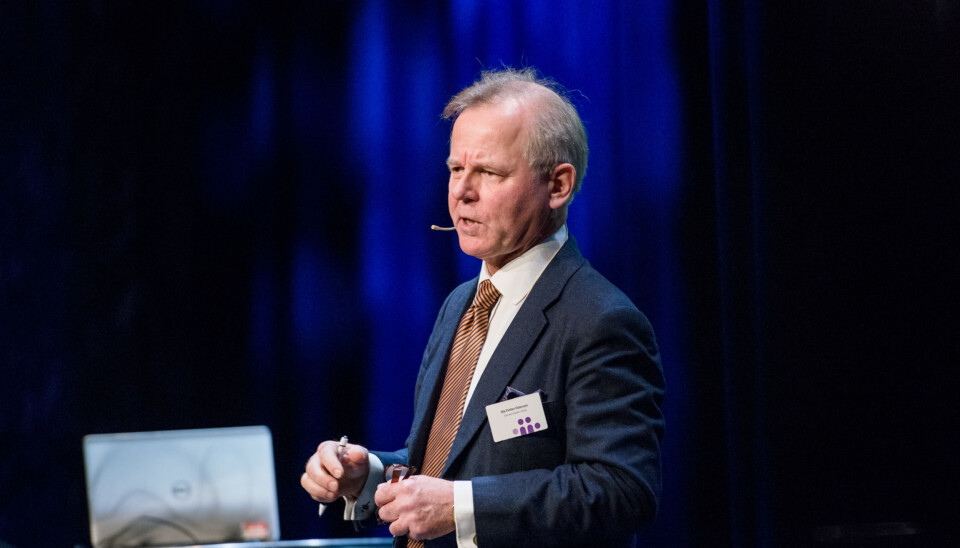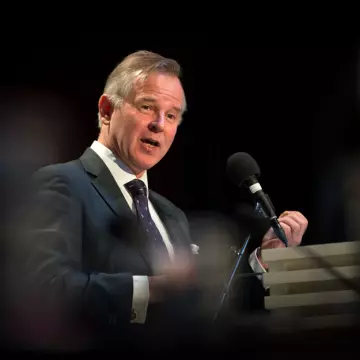
Our students are the leaders of the future
Rector Ole Petter Ottersen at the University of Oslo is asking who should be held accountable for the implementation of the Sustainable development goals.
OBS! Denne artikkelen er mer enn tre år gammel, og kan inneholde utdatert informasjon.
Every higher education institution that I know of refers to «sustainability» in its strategy documents. This reflects what has become second nature to universities and university colleges alike: An ambition to operate with a long time horizon for all their activities including research and education. What will be the impact of the UN’s 2030 Agenda?
Universities should be stewards of our intellectual, scientific and cultural legacy, but should also give a voice to future generations. In 2015, UN member states adopted the 2030 Agenda for sustainable development – including 17 Sustainable development goals (SDGs). These goals require that we think anew when we structure our educational programs and reach out to our collaborative partners. These goals will also inspire our research in many years to come.
The SDGs are meant to reinvigorate and organize our efforts to grapple with the global challenges within the realms of health and social justice as well as energy and climate. These new goals build on the eight Millennium Development Goals, adopted in 2000. But the SDGs cover more ground than the latter, and they demand a lot of the global governance systems that have to break away from old silos and ensure that the social, economic, and environmental dimensions of sustainability are seen in due context. Notably, it is imperative that health and environmental issues are not subordinated to economic goals.
This is one of the questions that we discussed at length in our Lancet-University of Oslo Commission, which addressed the root causes of health inequities. We also need to reflect on how the term «sustainability» is defined by policy makers. We have argued that the last decades have seen a pronounced shift in the connotation of the term «sustainability», to the extent that the current use of the term risks deflecting support away from the weakest, to those who have the ability to self-improve.
In my mind, the SDGs are spot on when they challenge us to think and work across sectors and disciplines. They are also right on target when they implicitly ask higher education institutions to forge new alliances – alliances that might be seen as unconventional and unorthodox, at first glance.
Even a cursory analysis of the SDGs tells us in no uncertain terms that the complexity of the tasks at hand is such that we have to bolster the dialogue between academia, government, business, and civil society. Anne-Birgitte Albrectsen - former UN Assistant Secretary General and incumbent CEO of Plan International – writes eloquently about this in a recent article.
Meanwhile we - as academic institutions – have to forge new alliances and ensure that our study programs adequately reflect the complexity of the Sustaiable development goals.
Ole Petter Ottersen
Our recent Life Science Conference epitomized the valuable insight that is gained through a closer interaction and more extensive exchange of ideas between sectors that do share a chequered history of communication. Among the governmental representatives was Oslo Governing Mayor Raymond Johansen, who emphasized that smarter and greener cities must be built on a platform of sound scientific evidence.
Among the business representatives was CEO of DNV GL Remi Eriksen who pointed to the need for a cross-sectoral cooperation at the crossroads of digitalization, data, and life sciences. DNV GL and Unilever are examples of companies that have developed a keen interest and strong engagement in sustainability and planetary health. The ambitions incorporated in the SDGs can be realized only if other transnational companies follow suit.
This leads us to the question of accountability. Given that the SDGs is the best recipe we have for a sustainable future, who should be held accountable for its implementation? This is an issue that we discuss in a recent issue of The Lancet.
In the UN Agenda it is stated that «it will be for all of us to ensure that the journey [to sustainable development] is successful». This journey will «involve Governments as well as parliaments, the United Nations system and other international institutions, local authorities, indigenous peoples, civil society, business and the private sector, the scientific and academic community—and all people». In our commentary in The Lancet we argue that the responsibility for achieving the SDGs cannot be entrusted to an unidentifiable and all-encompassing «we». There is a need for placing the question of accountability center stage in the debate on how to ensure that the ambitious global goals are realized.
Meanwhile we - as academic institutions – have to forge new alliances and ensure that our study programs adequately reflect the complexity of the SDGs. After all, the universities and university colleges are those institutions that educate the candidates that shall fill the positions in the big and responsible «we» – i.e., in government and business, and in the public and private sector as a whole. Our students are the leaders of the future. In this same future, the implementation of the SDGs will be a major ambition that inspires to collective action. Or so we should be allowed to hope.
UiO’s three transfaculty initiatives – UiO:Energy, UiO:Nordic, and UiO:Life Sciences referred to above – address each of the three dimensions of sustainability that figure so prominently in the UN 2030 Agenda – climate and environment, economic and social sustainability, and health. I am sure that there will be ample crosstalk between these three initiatives, and that - in the spirit of the SDGs - each initiative will forge new and «unorthodox» collaborative networks. It would bode well for the future if this line of thinking comes to pervade academia at large.
––-
Transforming our world: the 2030 Agenda for Sustainable Development. United Nations, New York; 2015.
Ottersen OP, Dasgupta J, Blouin C et al. The political origins of health inequity: prospects for change. Lancet 2014; 383: 630-667.
Engebretsen E, Heggen K, Das S, Farmer P, Ottersen OP. Paradoxes of sustainability with consequences for health. Lancet Glob Health. 2016 Apr;4(4):e225-6. doi: 10.1016/S2214-109X(16)00038-3.
Anne-Birgitte Albrectsen. Why collaboration will be key to achieving the Sustainable Development Goals (https://www.weforum.org/agenda/2017/01/realising-the-potential-of-cross-sector-partnerships/)
Engebretsen E, Heggen K, Ottersen OP The Sustainable Development Goals: ambiguities of accountability. Lancet. 2017 Jan 28;389(10067):365. doi: 10.1016/S0140-6736(17)30152-6.






Logg inn med en Google-konto, eller ved å opprette en Commento-konto gjennom å trykke på Login under. (Det kan være behov for å oppdatere siden når man logger inn første gang)
Vi modererer debatten i etterkant og alle innlegg må signeres med fullt navn. Se Khronos debattregler her. God debatt!